In September 2025, Singapore’s Building and Construction Authority (BCA) announced a major initiative at the International Construction Environment Week Industry and Awards Dinner:
Over the next three years, a new licensing system will be progressively implemented, significantly tightening certification and oversight for elevators, escalators, and large-scale construction projects. Under the new regulations, starting in 2027, new elevators and escalators in public spaces must be certified by licensed companies. From 2028 onwards, large-scale construction projects exceeding S$75 million in value must also be supervised by licensed firms.
This system marks Singapore’s transition from an individual certification model to a corporate certification framework. Singapore’s Minister for National Development (MND) Heng Swee Keat stated plainly: “This will align Singapore with international best practices and ensure we maintain high-quality and safety standards.”
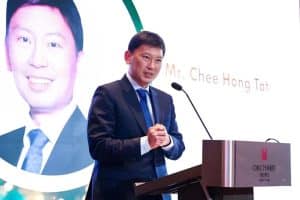
Singapore’s Minister for National Development Heng Swee Keat, Source: Lianhe Zaobao
For ordinary citizens, this means elevators and escalators will be safer in the future. For industry companies, it presents both challenges and opportunities to enhance professional standards.
So what exactly do the new regulations entail? Which companies need to apply for licenses? What is the specific application process?

I. Building and Construction Authority Introduces Licensing System,
Gradually Strengthening Oversight Over Next Three Years
1. Background of New Regulations
With accelerated urbanization, Singapore’s built environment has undergone significant transformation. Elevators, once primarily mechanically driven, have evolved into complex mechatronic systems involving control software, sensors, safety devices, and energy-saving features.
Large-scale construction projects are no longer simple assemblies of steel and concrete but incorporate high-difficulty processes like curtain walls, super-span structures, and intelligent construction methods.
These changes demand higher standards for safety, oversight, and professional expertise. The Building and Construction Authority (BCA) states: “Modern elevator and escalator systems are no longer standalone mechanical devices but components of complex systems. Large construction projects involve more intricate processes, requiring supervision by professionals with broader expertise.”
Furthermore, many countries worldwide have adopted corporate licensing systems to ensure comprehensive oversight. Singapore’s implementation of this new regulation proactively aligns with international standards to prevent potential issues.
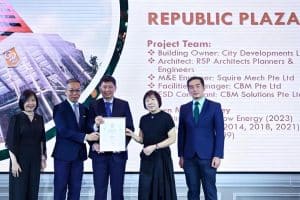
Singapore City Development Corporation receives green building certification. Source: Lianhe Zaobao
2. Three-Year Timeline
From 2027: New elevators and escalators in public spaces must be certified by licensed companies.
From 2028: Large-scale construction projects exceeding S$75 million in value must be supervised by licensed companies.
Transitional Arrangements: Individual engineers may continue providing certification services independently for smaller projects to maintain market flexibility.
While this timeline appears flexible, it leaves little preparation time for companies. Certification firms must gain accreditation from the Singapore Accreditation Council (SAC), establish robust quality and safety systems, and develop systematic training and career development plans for staff—a process requiring at least two to three years.
3. Industry Impact
Elevator Maintenance & Certification Firms: Smaller companies lacking comprehensive systems will face forced transformation or seek mergers and acquisitions.
Construction Regulatory Firms: Higher entry barriers mean fewer companies will qualify for projects exceeding S$75 million, but professional standards will significantly improve.
Individual Engineers: While company certification is the trend, individual engineers will retain market opportunities, particularly for small-to-medium projects.
The new system is expected to reshuffle the industry, leaving only the most competitive firms standing.

II. Guide to Applying for Singapore Elevator Licenses
1. Who Needs to Apply?
Over the next three years, companies involved in the following areas must apply for an elevator license:
– Companies installing, repairing, or certifying new elevators and escalators in public spaces;
– Contractors undertaking mechanical and electrical system integration;
– Companies providing elevator maintenance services to government agencies or large commercial complexes.
Simply put, any company wishing to engage in elevator or escalator certification work in public domains must hold a license.
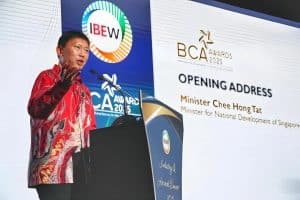
Singapore Minister for National Development Heng Swee Keat, Source: Lianhe Zaobao
2. Application Process (via GoBusiness Platform)
① Company Registration
Must first register as a legal entity with ACRA (Accounting and Corporate Regulatory Authority), typically as a private limited company (Pte Ltd).
Ensure good standing with IRAS (Inland Revenue Authority of Singapore) and no serious tax defaults.
② Professional Certification
Complete the accreditation process through the Singapore Accreditation Council (SAC).
The company must demonstrate testing capabilities and technician qualifications compliant with industry standards.
③ Quality and Safety Management Systems
Typically requires submission of ISO 9001 (Quality Management) and ISO 45001 (Occupational Health and Safety Management) documentation.
This proves the company maintains long-term, stable implementation mechanisms for safety and quality.
④ Application Submission
Submit the license application through the GoBusiness Licensing portal, providing company details, technical personnel list, management system certifications, and other required documents.
⑤ Review and Approval
The Building and Construction Authority (BCA) conducts document review and may perform on-site assessments.
If standards are met, a license is issued, valid for several years and requiring periodic renewal.
3. Application Requirements
Employ at least one registered elevator engineer;
Maintain fixed office premises and technical support facilities;
Provide employee training and career development plans to ensure continuous skill enhancement.
4. Timeline and Costs
Approval time: Approximately 3–6 months;
Fees: Vary by license category and company size, ranging from several thousand to tens of thousands of Singapore dollars.
5. Common Questions and Solutions
How can SMEs address this? Consider partnering with larger firms as subcontractors.
What if individuals already hold personal certifications? Individuals may continue practicing on small-scale projects or private residential works.
Is the application difficult? Key is to prepare ISO systems and SAC certification well in advance to avoid last-minute rushes.
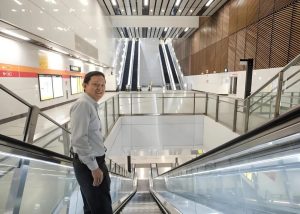
Engineer Chua Tong Seng, Source: Lianhe Zaobao

III. Guide to Applying for Singapore Construction Supervision Licenses
1. Who Needs to Apply?
According to the Building and Construction Authority’s timeline, starting in 2022, the following entities must apply for a Construction Supervision License:
Construction supervision companies responsible for large-scale projects exceeding S$75 million in value
Contractors and consulting firms involved in public infrastructure, large shopping malls, and integrated development projects
2. Application Process (Expected Launch in 2026)
① Company Registration and Tax Compliance
Must be registered with ACRA and maintain a clean tax record with IRAS.
② Certification Mechanism (SAC expected to launch in 2026)
Companies must pass SAC’s construction supervision certification system to demonstrate sufficient capability.
③ System Documentation Submission
Submit management system documentation for ISO 9001 (Quality), ISO 14001 (Environment), and ISO 45001 (Safety).
④ Building and Construction Authority (BCA) Approval
Review of the company’s past project experience, number of registered professional engineers, and safety records.
⑤ License Issuance
Approval is required before undertaking large-scale regulated projects valued at S$75 million or above.
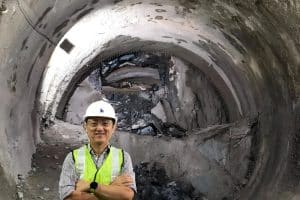
Engineer Chua Tong Seng, Source: Lianhe Zaobao
3. Application Requirements
Must have at least one team comprising registered professional engineers and registered architects;
The company must possess no less than 5 years of experience in large-scale projects;
Sufficient financial strength to undertake long-term regulatory projects.
4. Timeline and Costs
Approval timeframe: Estimated 6–9 months;
Application fees: May exceed elevator license costs, depending on project scale and category.
5. Practical Recommendations
Large Enterprises: Plan early, preparing ISO systems and certification materials two to three years in advance;
SMEs: Consider participating through joint ventures or as subcontractors;
Talent Pool: Recruit and train registered professional engineers proactively to meet regulatory requirements.
Conclusion: Competitiveness Behind High Standards
The Building and Construction Authority’s new licensing system not only raises industry thresholds but propels the entire sector toward higher quality and safety standards.
The introduction of elevator licenses and construction supervision licenses signals a future where Singapore’s urban environment will be safer, more professional, and more internationally competitive. For businesses, this presents both challenges and opportunities. Proactive planning and responsive action are key to securing future market success.
For the public, the ultimate outcome of this system implementation will manifest in safer elevators, more reliable buildings, and a more competitive city image.
As one industry insider remarked: “Only by fully leveraging our employees’ potential and adaptability can we maintain a competitive edge in today’s volatile environment.”
Note: References sourced from Singapore’s BCA, SAC, MND, ACRA, GoBusiness, IRAS, Lianhe Zaobao, and comprehensive news media reports. Reproduction requires attribution; contact for removal if infringing.
……
